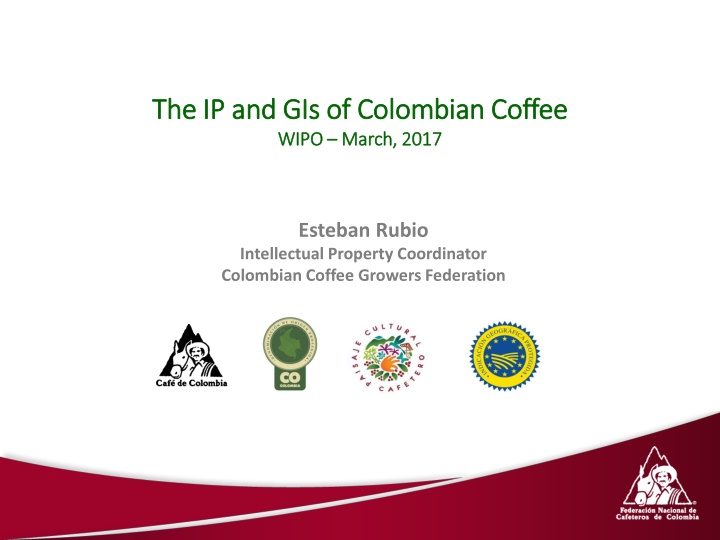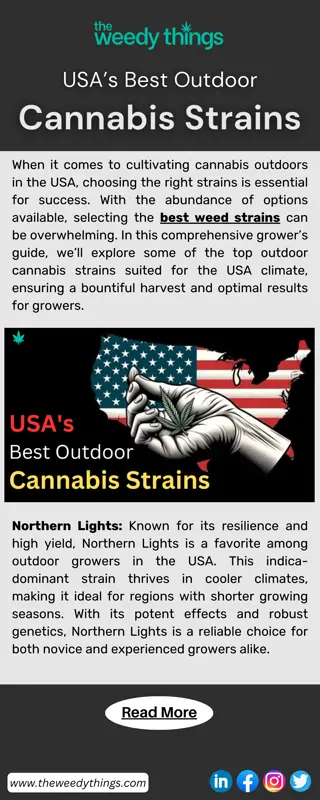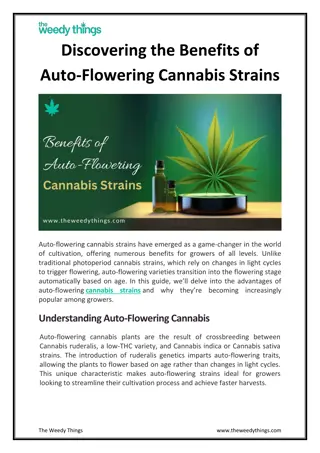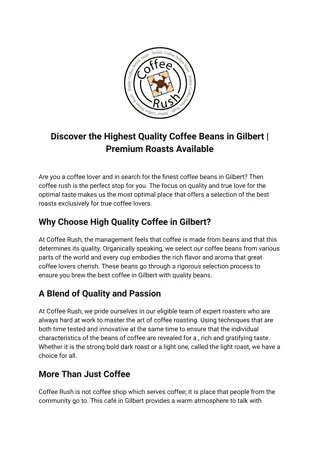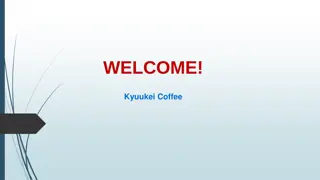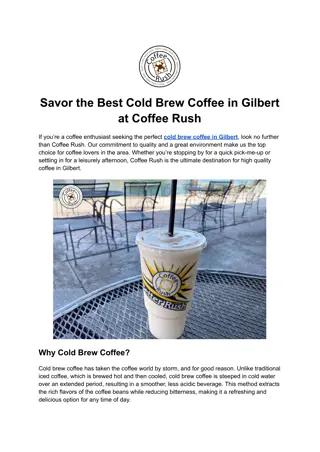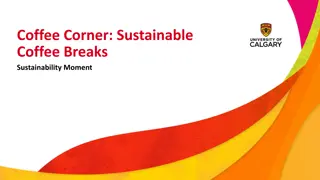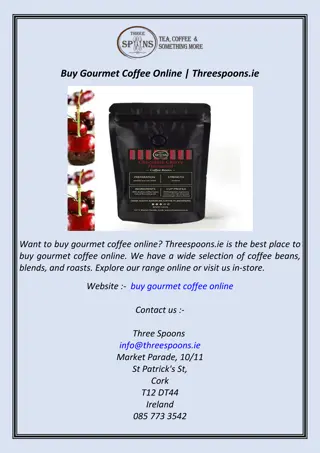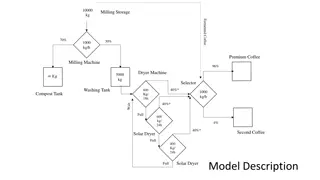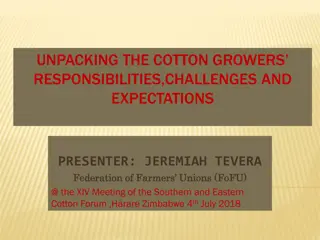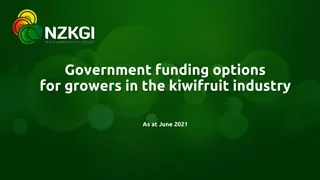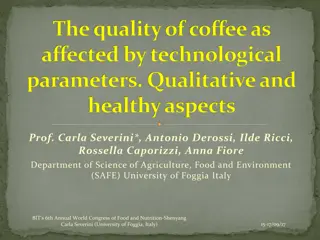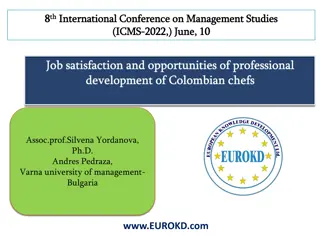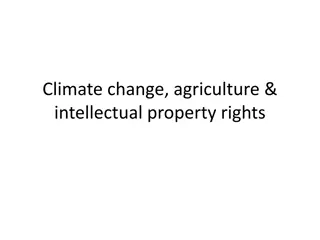Intellectual Property Strategy of Colombian Coffee Growers Federation
The Colombian Coffee Growers Federation plays a crucial role in supporting coffee-growing families in Colombia through various programs and initiatives. Their focus on intellectual property strategy aims to strengthen consumer relationships by highlighting the unique characteristics of Colombian coffee culture and promoting the origin of their products. Through strict quality controls and innovative marketing approaches, they strive to create a distinctive brand that symbolizes the excellence of Colombian coffee.
Download Presentation

Please find below an Image/Link to download the presentation.
The content on the website is provided AS IS for your information and personal use only. It may not be sold, licensed, or shared on other websites without obtaining consent from the author.If you encounter any issues during the download, it is possible that the publisher has removed the file from their server.
You are allowed to download the files provided on this website for personal or commercial use, subject to the condition that they are used lawfully. All files are the property of their respective owners.
The content on the website is provided AS IS for your information and personal use only. It may not be sold, licensed, or shared on other websites without obtaining consent from the author.
E N D
Presentation Transcript
The The IP and IP and GIs GIs of WIPO WIPO March of Colombian Colombian Coffee March, 2017 , 2017 Coffee Esteban Rubio Intellectual Property Coordinator Colombian Coffee Growers Federation
Topics Background: FNC and the IP strategy of Colombian coffee International experience 1. Treaties and regulations 2. The Andean Community 3. The European Union 4. Switzerland Problems: legal and technical
Background: the Colombian Coffee Growers Federation Colombia is coffee 1% 3% 921.000 ha. 588 municipalities 20 departaments 560.000 coffee-growers 2 000.000 employments 96% are small coffee- growers (1.5 ha.) 96% Peque os 0-5 has Medianos 5,1 -10has Grandes 10,1 en adelante
Background: the Colombian Coffee Growers Federation The Colombian Coffee Federation supports 563.000 families State- supported Collective funds Federation Producer / coffee grower Private NGO Democratic
Background: the Colombian Coffee Growers Federation Benefits ( public services ) to coffee-growing families Cooperatives Buencaf (freeze dried coffee) Cenicaf (R+D) Purchase warranty Innovation and investigation Added-value strategy Almacaf (exports logistics) Quality control Promotion and publicity Procafecol (Juan Valdez) Social investment Education Tehnical assistance Manuel Mej a Foundation Local committees Extension service (tech transfer)
Background: the IP strategy A strategy that strengthens the relationship with consumers Ingredient brand Origin Product Colombian Character Strategic partners Experience
Background: the IP strategy Strict quality controls for Promotion of the unique characteristics of its origin and coffee culture exports Character creation that symbolizes the positive characteristics of Colombian coffee culture Advertisement towards consumers to generate pressure for demand over roasters Roaster Ingredient-brand to 100% Colombian and a distinctive phrase Incentives
Current registrations Protection Mechanism Territory Procedure Trademark License Agreement TLA Trademark International Trademark License Agreement TLA North America (USA and Canada) Colombian Certification Mark Protected Geographical Indication European Union PGI Certification Andean Community Countries (Colombia, Ecuador, Peru and Bolivia) Appellation of Origin DO Certification Trademark License Agreement TLA Exclusive origin trademark International
Current registrations Legal background Appellations of origin: Colombian Superintendency of Industry and Trade, Resolution 4819 of March 4, 2005 Protected Geografical Indication European Comission, 2007; Switzerland, 2013 EU-Colombia FTA Regional appellations of origin: Cauca: Resolution 41788, August 10, 2011 Nari o: Resolution 6093, February 11, 2011 Huila: Resolution 17989, April 16, 2013 Santander: Resolution 50042, August 25, 2014 Sierra: Resolution 630, January 30, 2017 Tolima: Resolution 631, January 30, 2017
Current registrations 2007 2013 In process Granted Granted EU-Colombia FTA Colombian Coffee Colombian Coffee Regional Coffees Was granted the PGI status by the OFAG in Switzerland Was granted the PGI status by the European Commission in The European Union EU Colombia FTA
International experience: Andean Community Decision 486 Same rules that prevail over local legislation and are directly applicable Mandatory consultation with the Court of the Andean Community interpretative Underregulated 19 articles: formal requirements , who may request protection, authorizations, etc. No rules on relationship with prior trademarks or delegation. Pprocedure, requirements, lengthy process, official requests, new project for unregulated system Appellations of origin v. indications of origin Article 201. - An appellation of origin shall be understood to be a geographical indication consisting of the name of a particular country, region, or locality, or of a name which, without being that of a particular country, region, or locality, refers to a specific geographical area, which name is used to identify a product originating therein, the qualities, reputation, or characteristics of which are exclusively or essentially attributable to the geographical environment in which it is produced, including both natural and human factors. Article 221. - An indication of origin shall be understood to be a name, expression, image, or sign that indicates or evokes a particular country, region, locality, or place.
International experience: Andean Community Possibility of requesting validation of a GI protected in another country Article 218. - Competent national offices shall, where the petition is made by producers, extractors, manufacturers, or craftsmen with a legitimate interest in the matter or the respective public authorities, recognize appellations of origin protected in another Member Country. Appellations of origin, in order to be eligible for such protection, must have been declared as such in their countries of origin. Authorized use v. descriptive use Article 212. - The use of appellations of origin with respect to natural, agricultural, handicraft, or industrial products from the Member Countries shall be reserved exclusively for producers, manufacturers, and craftsmen with production or manufacturing establishments in the locality or region within the Member Country identified or evoked by that appellation. Only producers, manufacturers, or craftsmen authorized to use a registered appellation of origin may employ together with that appellation the term "APPELLATION OF ORIGIN." The provisions stipulated in articles 155, 156, 157, and 158 shall be applied in respect of protected appellations of origin, as relevant. Article 157. - Provided that it is done in good faith and does not constitute use as a trademark, third parties may, without the consent of the owner of the registered trademark, make use in the market of their own names, addresses, or pseudonyms, a geographical name, or any other precise indication concerning the kind, quality, amount, purpose, value, place of origin or time of production of their goods or of the rendering of their services, or other characteristics thereof, provided that such use is confined to identification or information purposes only and is not likely to create confusion over the source of the goods or services.
International experience: European Union and Switzerland European Union & Switzerland Single PGI system, however, local and national regimes (spirits, wine, other agricultural products) Very demanding system: requirements, new different procedure (2005 - 2007 / 2009 - 2013) *translation, costs, formal requirements, etc.* *no prior cases Colombia (blanks)* Other territories, other problems Costs for registration Different systems, names and regulations New or unused legislation (p. ej. DO Colombia in Colombia) Review of local legislation, new or undeveloped legislation (DO Colombia in Colombia) Several systems applicable to GI managed by separate entities (China) Coexistence with other regimes (health registrations and mandatory info) Lack of regulation in regards to relationship with trademarks - renewal/redesign, prior rights Compatibility with local legislation, common/generic product name
